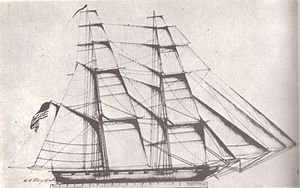USS Spark (1813)
 Sail plan of USS Spark
| |
| History | |
|---|---|
| Name | USS Spark |
| Laid down | date unknown |
| Completed | 1813 |
| Acquired | 1814 |
| Commissioned | circa 20 May 1815 |
| Recommissioned | 1 July 1816 |
| Decommissioned | circa 1825 |
| Fate | sold 1826 |
| General characteristics | |
| Type | Brig |
| Displacement | 310 tons |
| Length | 103' (between perpendiculars) |
| Beam | 25' 4" |
| Draft | 12' 8" |
| Propulsion | brig sail |
| Speed | not known |
| Complement | 90 |
| Armament |
|
USS Spark (1813) was a heavily armed brig in the services of the United States Navy, built for service in the War of 1812. However, she was completed too late for that war and was assigned, instead, to the Barbary Wars in the Mediterranean. After two voyages in support of that action, she was assigned to suppress pirates in the Caribbean, where she was successful in capturing a number of pirate ships and their crews.
Built in New York
The first ship to be so named by the Navy, Spark -- a privateer built in 1813 at Sag Harbor, Long Island, New York -- was purchased by the Navy at Baltimore, Maryland, in 1814 for service in the war with England. However, the war ended before the brig could get to sea for active service against the Royal Navy.
Barbary Wars service
Spark, commanded by Lt. Thomas Gamble, departed New York City on 20 May 1815 and sailed for the Mediterranean for operations in Commodore Stephen Decatur's squadron against pirates of Algiers.
She reached Gibraltar on 15 June and, two days later, helped in operations resulting in the capture of the Algerian flagship, Mashuda, near Cape de Gatt. On the 19th, she aided Epervier, Torch, and Spitfire in running Estedio ashore where she was boarded and captured.
After cruising in the Mediterranean through the summer, Spark sailed for home on 6 October in a squadron commanded by Commodore William Bainbridge and reached Newport, Rhode Island, on 15 November and was laid up for repairs.
Recommissioned for dispatch duty
Recommissioned on 1 July 1816, the brig sailed again for the Mediterranean on 6 September carrying a letter from the President of the United States for the Dey of Algiers and orders appointing Commodore Isaac Chauncey and Consul-General Shalter commissioners to negotiate for peace. Spark cruised in the Mediterranean until returning home in 1821.
Fighting Caribbean pirates
In the autumn of 1821, Spark, now commanded by Lt. John H. Elton, departed Boston, Massachusetts, for the Caribbean for operations against pirates. In January 1822, he captured a Dutch sloop and brought her and seven pirates to Charleston, South Carolina, for trial. She returned to the Caribbean and spent over three years suppressing buccaneers.
The brig returned home in 1825 and was sold at New York City in 1826.
References
 This article incorporates text from the public domain Dictionary of American Naval Fighting Ships. The entry can be found here.
This article incorporates text from the public domain Dictionary of American Naval Fighting Ships. The entry can be found here.
